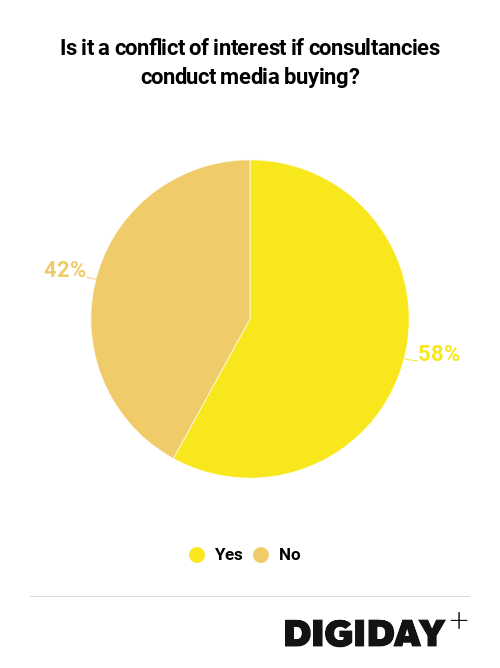Digiday+ Member Poll: It’s a conflict for consulting firms to conduct media buying

This research is based on unique data collected from our proprietary audience of publisher, agency, brand and tech insiders. It’s available to Digiday+ members. More from the series →
Consulting firms have waded into the advertising world in recent years in an attempt to compete with cumbersome holding companies with their own campaign strategy and creative services. Accenture, PWC, Deloitte, and others have acquired dozens of marketing and digital agencies between them to bolster such capabilities.
But until recently, consulting firms refrained from conducting media buying on behalf of clients, claiming a disinterest in low-margin businesses. That changed recently with Accenture Interactive’s announcement that it will begin pitching for clients’ media budgets, and now people are crying foul.
In an online poll of 24 Digiday+ members held last month on whether it’s a conflict of interests if consultants conduct media buying, the majority agreed that it did constitute a conflict of interest.

The issue the advertising industry has with consulting firms buying media is primarily the fact that those firms currently act as “independent” auditors of brands’ media spend. Some argue whichever company transacts the media can not be an independent auditor, since it has a clear advantage to enshrine their results while downplaying their competitors. Accenture claims it will avoid any conflicts because it won’t audit the companies that it purchases media for.
Part of the outcry among agencies and the digital media industry is likely due to the fact that media buyers feel increasingly challenged by consultancies. An earlier Digiday survey of media buyers found that 76 percent believe consultancies pose a competitive threat to media-buying agencies. Another issue is that now that Accenture has entered the media buying business, it leaves few independent auditors to use.
Advertisers themselves are unlikely to care about potential conflicts on interests consulting firms may have. Even though issues of transparency in media buying were brought to light by a 2016 report by the Association of National Advertisers, it still remained a top issue for advertisers according to a recent Digiday survey. Advertisers, it seems, could be willing to accept the risks of potential conflicts of interests if it resolves a problem that massive spending on third-party measurement tools and private marketplaces couldn’t fix.
More in Marketing

Why the New York Times is forging connections with gamers as it diversifies its audience
The New York Times is not becoming a gaming company. But as it continues to diversify its editorial offerings for the digital era, the Times has embraced puzzle gamers as one of its core captive audiences, and it is taking ample advantage of its advantageous positioning in the space in 2024.

Why B2B marketers are advertising more like consumer brands to break through a crowded marketplace
Today’s marketing landscape is more fragmented than ever. Like consumer brands, business brands are looking to stand out in a crowded and competitive marketplace, making marketing tactics like streaming ads, influencers and humorous spots more appealing.

As draft puts WNBA in spotlight, the NBA is speeding up ballplayers’ transition to creators
The NBA’s star athletes are its greatest marketing asset.





